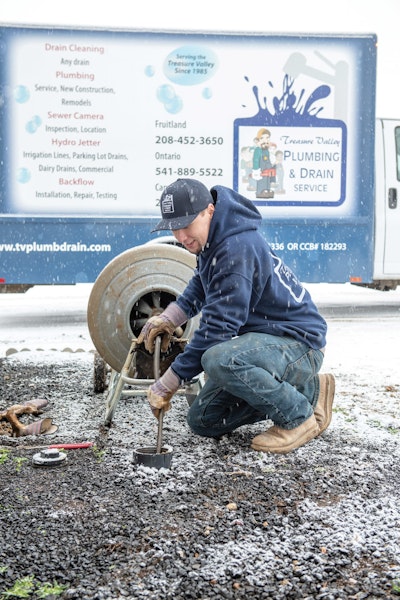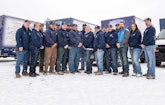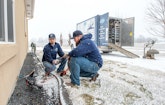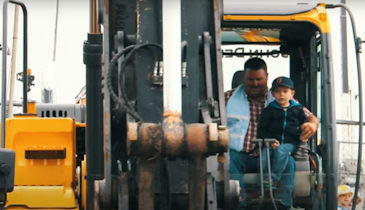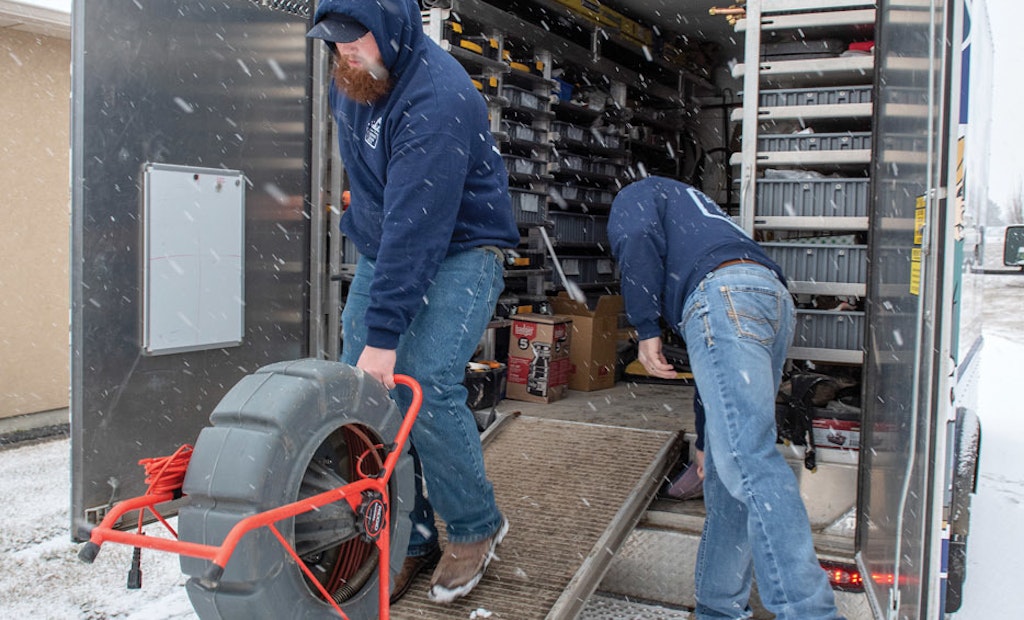
Cody Evenden-Griffin (left) and Jerimiah Brown unload a RIDGID SeeSnake inspection system. The company’s four specialized service trucks are equipped with a Hackney plumbing box that carries all parts and equipment to handle almost any plumbing or drain cleaning issue customers may have.
Not many companies could get away with calling themselves “a humble bunch of plumbers wanting to take care of your plumbing and drain service needs” without sounding inauthentic. Treasure Valley Plumbing and Drain Service is an exception.
The company is located in Fruitland, a bucolic southwestern Idaho community of about 5,000 people, sitting on the eastern bank of the Snake River that separates Idaho from Oregon. Part of the Ontario, Oregon, micropolitan area, Fruitland is also home to apple orchards and a family-oriented, small-town-America environment that persuaded Dave and Maurine Burt to settle there and raise their children. The couple opened a drain cleaning business in 1985 that 34 years later is serving customers across Treasure Valley.
Today, the company is well into a transition to second-generation ownership. It began when Gerard “Jerry” Robinson married his childhood sweetheart, who happened to be the Burts’ daughter. “Her dad had a local drain cleaning business when I came into the picture. He had a dream to expand his company and asked me to be a part of it,” says Robinson, now a co-owner and positioned to take Treasure Valley Plumbing and Drain Service into the future.
It wasn’t a huge career leap for Robinson. His father was a licensed electrician and he had spent post-high school years working construction. “I learned to build new homes and understood the plumbing in them. I worked at it for four or five years.”
He is still heavily involved in homebuilding: About half of the company’s business is installing plumbing and drain systems in new construction, nearly all of it residential with some light commercial properties sprinkled in. Two company crews are dedicated to running lines in those new houses. Four other crews perform service work. “In some ways, we are very diversified,” Robinson says. “I can borrow one of the service crew members, if I need him, and switch him over to finishing a house. I like our guys to be diversified. They can do construction work on Friday and be hydrojetting on Saturday.”
The construction side of the business is robust. It was even stronger in 2005 after Robinson joined and the drain cleaning company began to develop the plumbing side of its business. “It was a pretty good boom for a couple of years,” he says, looking back on the run-up to the recession that slammed the construction industry nationwide. Fortunately, the company owners had the foresight to anticipate the slowdown before it struck them. “We began to focus on services instead of construction. We knew it could keep us alive.”
It did. Now the company has expanded to include installing radiant floor heat systems, in which integrated hot-water piping in concrete flooring warms an interior room or parking area, and backflow prevention devices, which prevent contaminated and dirty water from re-entering municipal water distribution systems. The radiant floor work is not a big part of the company’s business yet, but Robinson anticipates growth. As for backflow, he and one other employee are licensed to install and annually inspect the preventive devices, which adds to their workload in summer months.
Pairing up
Robinson can perform any of the company’s service or new construction tasks and is cross-training all of his employees to do the same. To reinforce this principle, he nearly always dispatches two technicians to every service call, regardless of the nature of the service. Plugged drain, water heater problem, leaking pipe, a clogged sewer line in need of inspection — whatever the problem, a two-person crew answers the call.
“We have done that for years,” he says. “I think that came from when I started here. We had only one truck, and another guy and I worked service calls together. We decided to keep doing it that way because it seemed to serve our customers the best. It doesn’t seem to be an industry standard.”
Besides having an extra brain and pair of hands at a site to diagnose and resolve a service issue, two-man crews address two company needs: the systematic training of apprentice plumbers and multiplying the number of service calls each day. Among the company’s current employees are six journeymen plumbers (including Robinson), each of whom earned certification after four years of apprenticeship. They work closely with a third-year apprentice, two apprentices in their second year of training and a first-year apprentice. Working and learning go hand in hand at the company.
As for doing a maximum number of daily service calls, it seems counterintuitive to pair up repairmen at one location instead of sending them out individually to two jobs. Yet, Robinson says that, in practice, the company is able to complete six or seven calls a day with two-person crews compared to four or five when the technicians work individually. “With the second man on hand, we seem to be able to cover more work and to get jobs done quicker — and safer — almost every time.”
Some days, all four of the company’s service trucks are on the road. Most are dually Chevrolet 1-ton chassis (with the exception of the fleet’s oldest truck, which is an Isuzu). Each truck has a custom VT Hackney/Hackney service body and is loaded with the equipment a service technician is liable to need to resolve a problem.
“That’s another thing that sets us apart in our area,” Robinson says. “Our trucks are equipped with the technology to handle just about anything.” That means investing in drain cleaning machines and inspection cameras. Each service truck carries several models of Gorlitz Sewer & Drain cable machines ranging in size from 3/4 hp motors wed to 11/16 cable suitable for clearing sewer lines down to 1/4 hp units for unplugging sink drains.
The company relies on RIDGID SeeSnake cameras with 200-foot lines for inspection of water pipes, sewer pipes and drainpipes, a service the company playfully terms “Tour de Sewer.” Besides natural obstructions, the camera work has located kids’ toys, dead rodents and, on two occasions, wedding rings. One service call recovered a diamond band dropped down a toilet by a woman about to be married. The company performed the service free as a wedding gift.
But Robinson says a more frequent job is locating leaks in new homes after a homeowner or contractor has unknowingly punctured a PVC pipe when mounting a picture or TV on the wall. “We use a camera to find those leaks. It saves a lot of time spent tearing out Sheetrock when you know where the leak actually is.”
In the field
The firm’s oldest service truck is outfitted with a US Jetting system to clean out plugged sewer lines and drainlines. It includes two 100-gallon water tanks, a diesel engine yoked to a 3,000 psi pump and 300 feet of hose. The rig can blast through blockages in pipes up to 10 inches in diameter.
On occasion, the company’s jetting calls are to fields or orchards. Most of the agricultural land in the valley is irrigated, and irrigation lines sometimes become plugged because farmers typically pull water straight from the Snake River, which can introduce mud and rocks into a line. Or a root intrudes on a buried line to stanch the water’s flow. Whatever the cause of blockage, the jetter blasts it loose.
More often the crews are jetting home drains, light commercial (restaurant, apartment complex, car wash) sewer lines, municipal mains and parking lot drains in places like Ontario, Fruitland and Payette, Idaho.
Most service calls originate within a 20-mile radius of the company office, yet it is not uncommon for one of the trucks to respond to a call from a customer in Jordan Valley, Oregon, an hour and a half south of Fruitland or from a ski resort in McCall, Idaho, 2 1/2 hours north. Occasionally, a call will arrive from Boise some 50 miles east. “We’ve gotten calls from California,” Robinson says, attributing such errant encounters to confusion about town names. “We tell them a service call for them might be too expensive.”
Family ties
Weekend calls are accommodated by service technicians working a rotating schedule. “We try our best to give our employees the time they need at home and with their families, but you have to take care of customers, too,” he says. The company website mirrors Robinson’s comment, declaring the company’s commitment to faith, family and the business. “We try to keep family and faith tightly knit together in our everyday lives.”
Robinson believes the company is also distinguished from rival firms by its family of dispatchers. Maurine Burt’s tenure in the front office has honed the support team into a professional unit that relies on ServiceTitan software to keep track of trucks and appointments and licensing. “We are unique in that we answer the phone professionally and with expertise unmatched in Treasure Valley.”
So far, the formula has worked for Treasure Valley Plumbing and Drain Service. It has grown from a home-based, three-employee firm to one with an equipment yard and a 100-by-40-foot warehouse and office. The owners recently acquired an adjacent property with a building on it that may become a second company building.
“In the next three or four years, the Burts will retire or semiretire,” says Robinson, whose vision goes well beyond those years. “I have looked into expanding to another area with possibly a second shop. And I’d like to venture into some other services, such as trenchless pipe-laying work. We’ve had a little trenchless work done for us from a company out of Boise. I think that will be a good opportunity for us.”
A coaching change
In 1985, Dave and Maurine Burt started a drain cleaning business in Fruitland, Idaho. Dave Burt did the service work, drawing upon his building contractor experience, and made calls with a service van he’d put together and a septic tank pumper. Meanwhile, Maurine Burt, who has an accounting degree from Boise State University, kept the books. She shifted into the role of office manager after the staff and customer base grew enough to warrant an office.
For the next 20 years, the family business kept busy. In 2005, son-in-law Gerard “Jerry” Robinson completed his four-year journeyman plumber course and the company added “Plumbing” to its name. With that, the business got busier.
“The work has changed a lot since 1985,” Robinson says. “They didn’t have any mobile phones, for example, so he’d find a phone and check in as a workday went along.” Today, cellphones, smaller inspection camera units and more sophisticated jetting equipment speed the work. Furthermore, the internet has transformed marketing into a mostly online activity, supplanting traditional advertising on billboards and in telephone books, and the company has exploited the web.
In 2011, something else transformative occurred: business coaching. The Burts and Robinson were a member of a local business networking group that met weekly. There, they eventually became acquainted with Ed Renna, a business coach from Boise. “In plumbing school, they don’t teach you how to run a business,” Robinson says. “That’s a whole other education.”
The three began to meet regularly with Renna, weekly at first and then twice a month. The focus of a meeting is whatever is on the owners’ collective mind. “It might be different business strategies we want to try or some problems we may be having,” Robinson says. “He also helps us manage our team — how to teach them good customer service skills or speaking skills.” Renna talks regularly with other coaches about plumbing and drain cleaning and shares what he learns with the Treasure Valley Plumbing and Drain Service team.
The coaching has changed the way they do business. “Some things we were doing right. Other things we weren’t doing at all. We learned about closely tracking our marketing dollars. We learned about what’s good business and not good business. One thing that really stuck with us is goal setting. We began to set 90-day goals; annual goals; three-, five- and 10-year goals. The goals keep us on track.”
Becoming a fuller-service company in 2005 with the addition of plumbing services was a watershed for the company, but so was the decision to engage a coach, Robinson says. “Without a doubt, taking up coaching was a pivotal point in our business. It already has taken us above and beyond where I ever thought we would be.”
